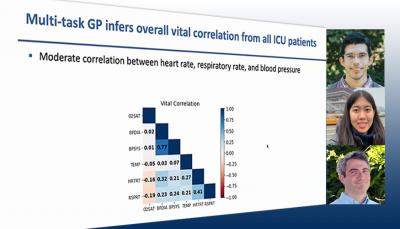
Held virtually over three consecutive Thursdays in early spring, this workshop focused on AI applications and possibilities in healthcare. Panelists and speakers included LLNL staff as well as academic and clinical professionals.
Select each day below to access a synopsis of workshop goals, the day’s agenda, a list of speakers, and any available recordings and slide decks.
View or download: welcome slides presented by DSI director Michael Goldman.
Electronic health records (EHRs) provide a wealth of information on the patient’s clinical trajectory, including their demographics, vital signs, medical test results, medications, and doctor’s notes. With EHRs becoming more widely adopted by healthcare providers in recent years, large amounts of rich, temporal, multimodal patient data for a variety of medical conditions are being generated. There is considerable potential for health informatics research and medical knowledge discovery by employing statistical and machine learning methods for analyzing EHRs. EHRs have successfully been used for disease prediction, patient risk stratification, and latent health state discovery, among others.
The goal of this session was to discuss recent developments, challenges, and opportunities in data science for EHRs. The session will feature a series of talk on recent work in statistics and machine learning specific to this type of data. We also hosted a panel to discuss the main challenges in this area. Data privacy considerations and standardization across healthcare providers is one key issue. On the methodological front, one current challenge is to address the lack of clinical controls and developing counterfactual methods for EHR analysis.
View or download:
- March 11 agenda PDF
- March 11 panel discussion video moderated by Amy Gryshuk (LLNL)
- Bradley Malin (Vanderbilt University): De-Identifying Electronic Medical Records through Artificial Intelligence video
- Vincent Liu (Kaiser Permanente): Towards the Learning Health System: The Promise and Pitfalls of EHR Data video
- Jose Cadena (LLNL, begins at 30:35): Joint Electronic Health Records Analysis via Multi-Task Gaussian Processes video
- Jan Nygard (Cancer Registry of Norway): Analysing National Health Registry Data - Examples from Norway video
- Boya Zhang (LLNL): Pre-Treatment Prostate-Specific Antigen Records in Risk Evaluation of Prostate Cancer slides
Actionable AI for healthcare refers to models and processes that lead to knowledge discovery or information that can be acted upon by domain experts. The main goal when developing actionable models is not just maximizing accuracy or predictive power; rather, the focus is on generating results that are human-interpretable, consider realistic constraints, and can be taken into consideration to make an informed decision.
For example, when modeling the risk of death of a patient given his/her medical history, in actionable AI, it is not sufficient to develop a model that accurately gives a probability of death. An analyst should be able to understand how the model produced the answer and which aspects of the patient’s history are most relevant to predict risk. Health experts should be able to take these results into consideration to decide which course of action to take in the patient’s treatment.
The goal of this session was twofold. First, we surveyed recent applications of actionable and interpretable AI techniques to healthcare problems through technical talks presented by academic, national lab, and clinical researchers. Second, we provided a forum to discuss current challenges and opportunities to further integrate machine learning models into medical practice and decision-making.
View or download:
- March 18 agenda PDF
- March 18 panel discussion video moderated by Amy Gryshuk (LLNL)
- Heather Meeks (Defense Threat Reduction Agency): Revealing Hidden Secrets: The Role of ML in Identifying Incipient Events video
- Sam Nguyen (LLNL): Early Prediction of Adverse Outcomes for COVID-19 Patients, with Shapley Interpretations video | Nguyen slides
- Akshay Chaudhari (Stanford University): Beyond Image Interpretation: AI for MRI Acquisition and Reconstruction video
- Jayaraman Thiagarajan (LLNL): Building Reliable and Interpretable Clinical Models via Prediction Calibration video
- Prithwish Chakraborty (IBM): On User-Driven Explainability for Healthcare video
- Valentina Pedoia (UCSF): Intelligent Imaging to Study Degenerative Joint Disease video
COVID-19 is an infectious respiratory disease caused by the SARS-CoV-2 virus that emerged in December 2019 and quickly spread throughout the globe. The COVID-19 pandemic is a severe global health threat that has taken millions of lives, exerted significant pressure on often limited healthcare resources, and devastated countries and economies. The long-term COVID-19 impacts are still largely unknown, but is expected to be experienced for decades.
The goal of this session was to discuss and identify potential use of AI technologies to facilitate rapid response to COVID-19, such as improving patient diagnosis, developing new treatments, and improving overall medical and hospital care. We also hosted a panel of experts in the medical and AI fields to discuss ongoing research efforts and point out challenges for further progress in medical AI systems with focus on infectious diseases and quick response to healthcare-related crises.
View or download:
- March 25 agenda PDF
- March 25 panel discussion video moderated by Amy Gryshuk (LLNL)
- Bryan Lewis (University of Virginia): Guiding COVID-19 Response and Policies through Disease Modeling and Outbreak Analytics video
- Jonathan Allen (LLNL): Computational Drug Design for Small-Molecule Antivirals video | Allen slides
- Ben Smarr (UCSD): The Information Reformation and Smart Public Health video
- Tom Desautels (LLNL): Creating a Platform for Rapid Computational Antibody Design via ML, HPC, and Laboratory Experimentation video | Desautels slides
- Leo Anthony Celi (MIT): Data Sharing in the Era of COVID-19 video
- Brian Spears (LLNL): Evaluating the Spread of COVID-19 using AI-Driven Simulation video | Spears slides




